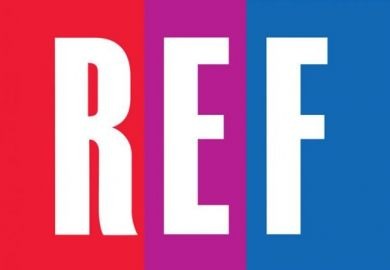Much has been said since this month’s publication of the initial decisions about the next Research Excellence Framework.
Some colleagues are joyously anticipating a boost to the inclusive culture they’ve been working for. Others have been cynical about tokenism and the new ways institutions will find to game the system. Hyperbolic responses to the “slashing” of the value of outputs have tried to pull the REF into the culture wars. A degree of healthy indifference has been palpable, too.
A headline aim of REF 2028 is to facilitate an “inclusive and collaborative research system that supports a diversity of people, ideas, institutions, methodologies, outputs and activities”. Institutions will be able, for instance, to return contributions from staff without a contractual responsibility for research. This potentially widens the eligible pool to postgraduates, technical professionals, research managers and career developers, practitioner and industry partners, teaching and scholarship colleagues, and anyone else who can demonstrate a substantive institutional link (0.2 FTE for at least six months).
This should finally make visible the hidden strategic and operational work that enables those of us with conspicuous authorship, improving their morale. Moreover, these submission-newbies naturally work in teams and represent a wider variety of protected characteristics, so this change should straightforwardly foster more diverse research teams. It could also drive more diverse recruitment because institutions will need to show that their workforces have a range of backgrounds and assets beyond a clutch of 4* outputs.
Moreover, if staff who move in and out of academia from other sectors become “REFable”, their value and respect should rightly increase, making “alternative” career paths more attractive.
But there are potential downsides. Paradoxically, this drive for inclusion could lead to greater competition. Given the widening of the REF-returnable staff pool and the removal of the minimum and maximum number of outputs attached to individuals, some academics will inevitably miss out. This risks reviving the REF 2014 stigma of not being submitted, resulting in disengagement and damaged egos.
In addition, some groups, such as early-career researchers, might be disproportionately excluded. Submission quotas for career stages or profiles might be an answer, but this could also bring negative consequences. If outputs by postgraduate researchers become eligible for submission, quality pressures on our researchers-in-training are likely to increase. Similarly, non-academic staff might not appreciate the removal of their previous protection from the anxieties around REF inclusion and performance.
More broadly, some warn that the shift towards assessing culture will diminish the importance of quality research. But the fear that greater inclusivity will compromise quality is patently false. More diverse teams demonstrably lead to more innovative, impactful work.
REF 2028’s aim to support a wider range of outputs is manifested in various ways. For instance, in the “Contribution to Knowledge and Understanding” section, at least 10 per cent of the sub-score will depend on broader contributions to the advancement of a discipline. Similarly, in “Engagement and Impact”, an evidence-based statement on wider contributions beyond the submitted case studies will be worth at least 20 per cent of the sub-score.
These changes should at last reward the important business of EDI work, mentoring, public engagement, advocacy, software development and the many other ways that researchers spend their time. Getting to grips with this enriched conception of research will impose greater burdens on internal and external peer reviewers, but it should enable researchers to be as proud of their replication studies, pre-registered protocols, datasets, review articles, policy reports and practitioner guides as they are of standard journal articles.
It will also encourage us to recognise colleagues as richly talented, not merely as producers of outputs, improving morale and subduing imposter syndrome. The removal of the minimum 2* rating for underpinning research will also legitimise valuable impacts based on non-standard research.
These perhaps unexpectedly radical gains demonstrate the power of careful, evidence-based lobbying by those behind the likes of the Hidden REF (“Celebrating all research outputs”), DORA, COARA and The Metric Tide. And judging by my inbox, the announcements have pricked up ears in previously hard-to-reach corners of my institution, including members of the professoriate previously cynical about the research culture drive. Researchers buy into our work for various reasons, and the REF incentive will be a big one if, as promised, the exercise remains consultative and keeps its burden “proportionate” (such as by using a word-limited structured form for the “People & Culture” element, replacing the sprawling, freeform narratives of its predecessor).
Although my response to the initial decisions is upbeat, colleagues should of course question it. With an estimated price tag of £471 million in 2021, the sector cannot afford to get it wrong. We should be wary of making changes that might damage our culture or render the REF ineffective. I would even accept no change to the overall results as long as REF 2028 drives systemic and behavioural changes to improve our research culture and, therefore, quality.
And, to reiterate, I think it will. I’m hopeful it will help to eliminate our existing research culture’s ego-driven hyper-competition and the toxic superiority that some traditional researchers show for research enablers. The weaving of culture through all three elements of the assessment and the requirement to evidence improvement should safeguard against performativity, though this will depend on the metrics used.
Rather than launching performative activity that will make us all even busier, universities should use REF 2028 to free up their staff to get on with what they do best, with collaboration, integrity and autonomy.
Cat Davies is dean for research culture and professor of language development at the University of Leeds.
Register to continue
Why register?
- Registration is free and only takes a moment
- Once registered, you can read 3 articles a month
- Sign up for our newsletter
Subscribe
Or subscribe for unlimited access to:
- Unlimited access to news, views, insights & reviews
- Digital editions
- Digital access to THE’s university and college rankings analysis
Already registered or a current subscriber? Login








